What does Magnesium do?
Magnesium is a helper for the rest of your body. It is involved in over 600 chemical reactions that occur within your body. This includes energy creation, protein formation, gene maintenance, muscle movements, and regulating your nervous system. Beyond magnesium’s role as a chemical helper, researchers have attempted to connect it to numerous other benefits, but results have remained inconclusive. Potential benefits needing further research include magnesium’s impact on:- Exercise performance (2015 study)
- Managing depression (2015 study)
- Decreasing risk of type 2 diabetes (2017 study)
- Reducing migraines (2016 study)
- Bone health (2021 study)


